Can My Baby Start Solid Foods Before 6 Months?
- Why starting solid foods prior to 6 months is not only unnecessary but how it can be harmful
- What the most common conditions and situations are that pressure parents to start solid food early
- The one instance where it may be beneficial to start a solid food prior to 6 months of age
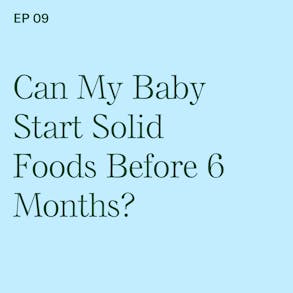
LISTEN TO THIS EPISODE
Episode Description
Is it ever safe for babies to start solid foods before 6 months of age? In one instance: yes…but for the remainder of babies, there is no upside - and only potential harm - in starting solid foods too early. In this episode we look at reasons why parents are pressured to start solid foods early as well as the data supporting the one instance when it might be appropriate to begin prior to 6 months of age.

Links from This Episode
- Baby-Led Weaning with Katie Ferraro program with the 100 First Foods™ Daily Meal Plan, join here: https://babyledweaning.co/program
- Baby-Led Weaning for Beginners free online workshop with 100 First Foods™ list to all attendees, register here: https://babyledweaning.co/baby-led-weaning-for-beginners
Other Episodes Related to This Topic
- Episode 2 - 5 Baby Milestones to Begin Baby-Led Weaning Safely | What Your Baby Should Be Able to Do Before Starting Solids
- Episode 110 - Catch-Up Weight: Why Starting Solids Early Will Not Help Your Baby Gain Weight with Rosan Meyer, PhD, RD
- Episode 146 - Setting Your Baby's Sleep Schedule when Starting Solids with Aubrie DeBear, PsyD
- Episode 182 - GERD: Does Starting Solids Early Help Babies with GERD? with Peter Lu, MD
- Episode 266 - Infant Weight Loss: What to Do When the Doctor Says Your Baby Isn’t Gaining Weight with Rosan Meyer, PhD, RD
Resources and Research
- Meek, Joan Younger et al. “Policy Statement: Breastfeeding and the Use of Human Milk.” Pediatrics vol. 150,1 (2022): e2022057988. doi:10.1542/peds.2022-057988
- World Health Organization. “Infant and young child feeding.” Factsheets, 9 June 2021. https://www.who.int/news-room/fact-sheets/detail/infant-and-young-child-feeding

Latest Episodes
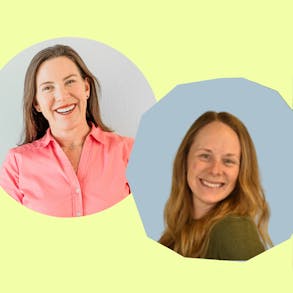
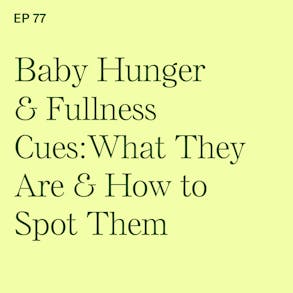
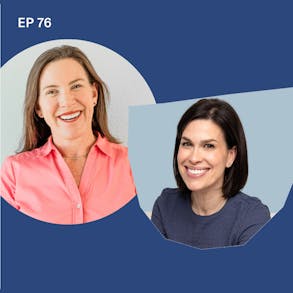
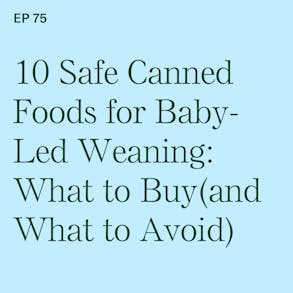
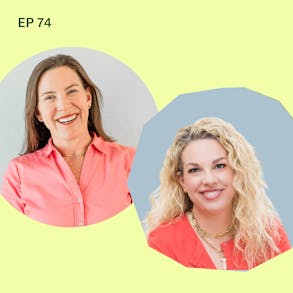
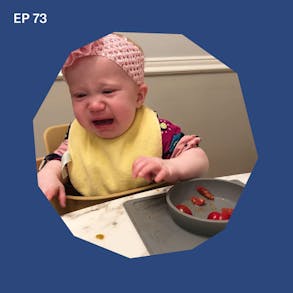
Katie Ferraro (0s):
So this bombs like all over me, six months, one week, six months, two weeks, I was like, the baby's not sitting up. Yet at six months and three weeks, everything clicked that baby was sitting up. Other signs were there. Baby-Led Weaning off the bat, just crushing it. And the mom was like, this is so much fun. I'm so glad I waited. Hey there, I'm Katie Ferraro, Registered dietitian, college nutrition professor, and mama of seven specializing in Baby-Led Weaning. Here on the Baby-Led Weaning Made Easy podcast I help you strip out all of the noise and nonsense about feeding, leaving you with the competence and knowledge you need to give your baby a safe start to solid foods using Baby-Led Weaning.
Katie Ferraro (47s):
Hello and welcome back to the Baby-Led Weaning made easy podcast. This is Katie Ferraro, registered dietitian. I'm a mom of seven and I specialize in Baby-Led Weaning. So if you're just learning about Baby-Led Weaning, it's an alternative to traditional spoon-feeding with Baby-Led Weaning your baby learns how to feed himself wholesome, soft age appropriate foods from his or her first bites. The key there is age appropriate, and that's the topic of today's conversation. We're talking about. Can you feed your baby solid foods before six months of age? Can you, well, we're going to answer that question. I want to start out today's episode.
Katie Ferraro (1m 29s):
As I do every episode with a Baby-Led Weaning tip of the day, waiting a few extra days or weeks can make a world of difference in determining whether or not your baby is ready to start solid foods. And as a result, it can make it incredibly safer to wait. So I'm going to show you in today's episode now, there's are a few instances where babies may need to start solid foods earlier, and we're going to go through those, but they're not the situations that you're probably thinking of right off the top of your head. And they're probably not the ones your mother-in-law's feeding into your ear, trying to tell you that you should be starting to spoonfeed your baby at four months of age.
Katie Ferraro (2m 11s):
So I want to tell you guys a quick story about a friend of mine. I recently met with her and her six month old baby, who was her third baby. So this is a mom who I loved dearly, but her two children she's says, you know, they're picky eaters and she struggles a little bit with feeding just recently heard about Baby-Led Weaning. Will you help me learn how to do it for my six month old baby? So I met with her one week at a play date and I was like, you ready to do this? And she's like, I don't know. Do you think the baby's ready? She's like, I don't feel like my baby's ready. I was like, are you not ready, mom? Or is your baby not ready? And she's like, no, I love breastfeeding, but she should start solids. Let's take a look at the baby. Not showing the signs of readiness to feed met again a week later at a different event.
Katie Ferraro (2m 53s):
Like, let me see that babysit, baby. Couldn't sit up relatively on assisted. It was kind of disinterested in food, still a little floppy. And the mom was like, this is ridiculous. This baby's now six months, almost two weeks of age. And I was like, you know what? Hang tight. Just like, but my other two babies, they were ready to eat solid foods. At six months of age, I know what I'm doing. It's like, I, I trust that, you know what you're doing, but even if you know what you're doing, if you're doing it on a baby, who's not ready to start solid foods, it's not safe. So we're going to talk today about why we don't introduce solids too early. And just to, you know, not leave you hanging the next week. When I hung out with her, I was like, let me see that baby set up.
Katie Ferraro (3m 33s):
She's like the baby was sitting up. Like it was amazing in a three week span, how far the baby had come with regard to her core strength and her ability to sit up and to start feeding herself. And now I just checked in with a mom recently. I haven't been able to see her for awhile. She was like, it's like, how's it going? She's like, this is amazing. This baby eats everything. This is so much fun. This is a world of difference. I never experienced this with my first two kids. And it's so cool to hear a mom of three kids see it all click because of Baby-Led Weaning. And to really take away a lot of her frustrations with feeding her family. And as a caveat, this mom noticed that the older children are starting to try a greater variety of foods because she's kind of taking advantage of that competitive nature of toddlerhood where, oh, the baby's trying this food today.
Katie Ferraro (4m 27s):
Do you guys want to try beets? Oh, look at the baby eating beets. Do you want to explain to the baby what color beets are? What the feeling of beats are in your mouth? And then all of a sudden the older kids are a little bit more engaged in Baby-Led Weaning. So parents will often ask me, can Baby-Led Weaninghelp make my older toddler less picky. It's not a guarantee, but anytime you're increasing the number of exposures in the variety of tastes and textures and foods and flavors, older children benefit from that as well. And another tip there, if you do have older children try to include them in the preparation of the food for the baby and the rest of the family, as much as possible toddlers and children are much more likely and inclined to try foods that they helped prepare than they were if you were just a plop it in front of them.
Katie Ferraro (5m 16s):
So we're going to be talking today about whether or not you can start solid foods before your baby is six months of age. So why does this six month mark matter? First of all, from a nutrition standpoint, I want you guys to realize that prior to six months of age, your baby does not need anything besides breast milk and or formula. Now, baby food companies, baby gear companies, they do everything they can to make you think your baby needs to start eating at four months of age. But if you look at every major international health body, they say across the board, you don't start complimentary foods until the baby is six months of age.
Katie Ferraro (5m 56s):
You just don't need to. Now sure you could, right? You could always squeeze a pouch into your baby's mouth or force, feed your baby to eat purees by spoon and say, look, the baby's eating, but just because you can do something doesn't mean you should. So keep in mind that a baby doesn't need anything except breast milk and or a formula prior to six months of age on top of that, they're not physiologically ready to safely swallow anything except breast milk and or formula at six months of age. So again, why would we engage in a practice? The practice of force-feeding by spoon as many people do prior to six months of age. If it's something that's going to increase the risk of choking, you do that early on your baby has a true choking event or a number of them.
Katie Ferraro (6m 44s):
There's going to be negative associations with feeding and being fed and sitting in the high chair. And we're literally starting off that baby's journey and relationship with solid food on the wrong step. So if I can convince you of anything today, it's that waiting until your baby is six months of age, plus exhibiting the other signs of readiness to feed that is so key for making sure that your baby is going to get a safe start to solid foods. And if you're interested in learning more about the other signs of readiness to feed, go ahead and check out the podcast episode. Number two, five things your baby should be able to do before starting solid foods. I think that will give you a lot of great insight.
Katie Ferraro (7m 26s):
The first one of course is being at or around the six month mark, the American academy of pediatrics does encourage breastfeeding as the sole source of nutrition for the first six months, and then to continue breastfeeding with complimentary foods until at least 12 months. So the takeaway message here is that breast milk will continue to be your baby's primary source of nutrition. And I should say breast milk and or formula because of course there's many instances in which the mother, the parents, the caregiver can't or choose not to either fully breastfeed, or you may be combining breast milk with formula, regardless, breast milk and or formula is all your baby needs up until six months of age and introducing solid foods prior to that can actually increase the baby's choking risk.
Katie Ferraro (8m 14s):
The world health organization reminds us that all infants should start receiving foods In addition to breast milk from six months onwards, you'll realize they don't say four months. They don't say five months. The AAP, the world health organization, they say six months, occasionally you'll see a range somewhere four to six months. I'm going to talk a little bit in a second about certain rare instances where it would be indicated to feed a baby prior to four months of age. But that doesn't necessarily mean that that's the safest decision because your baby may not be any more equipped, okay. To swallow these food safely. And I know we're all operating in a highly competitive environment, highly competitive parenting environment.
Katie Ferraro (8m 58s):
Well, my baby can walk at nine months. Well, my baby talked at 10 months. Well guess what? My baby started solid foods at three weeks of age. Okay. I'm exaggerating, but you don't get any extra credit or brownie points for your baby starting solid foods early. The benefit is in waiting. Now let's talk a little bit about some objections. These are things you hear from other people about, well, why should I wait until six months of age? What if let's talk about iron needs? Some people will say the baby needs to start solid foods earlier because they need to get additional iron. Here's the deal with iron. Your baby got a little large chunk of iron at the tail end of pregnancy from mom.
Katie Ferraro (9m 39s):
So if your baby was full term towards the end of pregnancy, mom transferred that iron to the baby and that lasts the baby up until about six months of age, you will see that it says sometimes between four and six months of age is when baby's iron stores start to dissipate. Of course, all babies are different. And there are many factors that affect iron status. If you're breastfeeding, you might be aware that breast milk is not a particularly rich source of iron. However, the iron in breast milk is very well absorbed by the baby's body. So even though you might not be as much as the iron-fortified infant formula, another baby's drinking the type of iron from mom's breast milk might be very well absorbed.
Katie Ferraro (10m 20s):
Now, in some instances, if your pediatrician or the medical team you're working with suspects, iron deficiency, or iron deficiency anemia, or their symptoms indicating that that's a problem, then yes, there may be the need to start iron earlier, but you certainly could do that through supplementation in a way that's safe for babies. And wait until six months of age, plus exhibiting the other signs of readiness to feed before you start solid foods in order to provide that iron. People also ask, well, what if I have a big baby? You have a big baby who needs more than breast milk or formula early on you guys. The size of your baby at a given age has nothing to do with their nutritional needs.
Katie Ferraro (11m 3s):
Certain babies may be bigger, particularly if they're formula fed and fed more formula than they need, but that doesn't mean that they should start solid foods earlier. They are no more ready or able or capable of safely swallowing foods at four months than a quote unquote typical sized baby would be at six months. The same thing goes for the objection. On the other side, sometimes parents will say to me, I was told I need to start solid foods for my baby because my baby is small. It doesn't work like that. If your baby is on the smaller end of the growth curve, if your baby has always been charting in the fifth percentile for whatever the parameters are, weight for age or length for age or head circumference, what have you, as long as your baby is staying on the growth curve and not dropping off precipitously or bumping up.
Katie Ferraro (11m 51s):
And then we say, you're doing a good job. Keep the good work. The goal is not to get your baby from the fifth percentile to the 95th percentile. That's not how it works. If you have a baby who has always been on the smaller side, you may have a child is going to be on the smaller side and that's fine. As long as they're not dropping off their growth curve. It's also inappropriate to recommend that a baby who's just starting solid foods, would ever be able to consume enough calories to promote additional weight gain. If you have someone who's telling you, your baby needs to start solid so they can catch up in their weight or gain more weight. That's an inappropriate recommendation. Again, your baby doesn't even have the skillset to know how to eat solid foods.
Katie Ferraro (12m 34s):
How could that baby ever be expected to eat enough of the solid foods to promote extra weight gain for babies who do need to gain weight should be working with a pediatric dietitian who can help you with a more realistic plan of fortifying the baby's formula or their breast milk, rather than expecting them to eat food right off the bat when they haven't even had the chance to practice learning how to do that. And that's what Baby-Led Weaning is all about giving your baby the opportunity to practice learning, how to eat, how to feed herself so that she can become an independent eater, which in turn helps prevent picky. Eating may promote a healthier relationship with food may be associated with healthier weights and reduce risk of overweight and obesity.
Katie Ferraro (13m 16s):
So a lot of this is tied to some of our very first decisions, which is well, how old is my baby when I start solid foods? Another argument that you'll hear sometimes is that my baby should start solid foods early because I want my baby to sleep through the night. As nice as that sounds there. A reason your baby is not sleeping through the night is not because they haven't started solid foods. I encourage parents to get their sleep schedule sorted out before they start solid foods. Within reason, if you've never paid attention to the sleep schedule, it's going to be hard for you to adjust a sleep schedule and start solid foods all in the same week. So I would say you don't want to wait too long past the six month mark, because we do know that babies who wait too long to start solid foods, that they also have an increased risk of selective eating, meaning picky eating.
Katie Ferraro (14m 2s):
So we don't want to start too early because it's dangerous. It could increase the negative associations related to feeding. If the baby has a choking incident, it also can increase choking risk. If they're starting too early, it can lead to some other medical complications as well since the baby is not yet ready to safely swallow those foods. On the other side, though, don't wait too long, either one instance where you may need to introduce solid foods or there is some data rather to suggest the idea that early introduction of solid foods is helpful is in the case of severe reflux. Okay? So there is some research that supports the idea that early introduction of solid foods may help reduce reflux symptoms in some but not all babies.
Katie Ferraro (14m 47s):
So the problem is if your baby is not showing the other signs of readiness to feed, but the baby has severe reflux, you could inadvertently be increasing the risk of choking and food allergy and some other intestinal situations by introducing solids too early. Now, of course, with each of your individual babies, you are going to want to meet with your pediatrician, explain or understand how the course of reflux has been going. But a thing that maybe can hopefully give you a little peace of mind is that estimations are that about half of infants have some degree of reflux, okay? And that becomes less common as your baby gets older reflux, generally peaks at three to four months of age.
Katie Ferraro (15m 29s):
So if that's where you are right now, please keep in mind that this is probably as bad as it's ever going to be. Infant reflux generally resolves itself. By the time the baby is 12 months of age, literally only like 10% of babies that started out with reflux will still have it at 12 to 14 months. And it's rare to see that level of reflux after 18 months of age. So if you can get through the three to four month period without solid foods, as you should, because your baby's not ready to eat. You'll notice that the symptoms are starting to subside, particularly as you approach the time where the baby's ready to start solid foods, but reflux might be one of those situations where again, there is some data to support the idea that early introduction of solid foods may be beneficial.
Katie Ferraro (16m 10s):
The last one I want to mention is, what if your baby's at high risk for peanut allergy? If you're familiar with a guidance for the introduction of peanut protein, in order to prevent peanut allergy, we know that babies who are at high risk for peanut allergy should be exposed to the peanut protein between four and six months of age. Well, that's a little sticky, no pun intended with the peanut butter there because babies four to six months of age, aren't ready to safely swallow foods. So there are some ways that you can actually mix peanut butter puffs with breast milk or formula to soften them to a space where they could be given to the baby. It's not ideal to feed a baby, anything except breast milk or formula prior to six months of age, but there are some workarounds for those babies.
Katie Ferraro (16m 58s):
Now having said that, you're all wondering, okay, well, is my baby at high risk for peanut allergy? And should I be doing that before six months of age for the good majority of the population? The answer is no. If you look at the updated guidelines and the research regarding the risk for peanut allergy, we now say that high risk babies are those who have established egg allergy and or severe eczema. Okay? So again, egg allergy and or severe eczema and not your run of the mild eczema that all babies have. You guys it's severe eczema, okay. As explained to you by your pediatrician or your pediatric dermatologist or the allergist, okay. Those are the things that put the baby at high risk for peanut allergy. And those are the babies who should consider introducing at least peanut protein prior to six months of age.
Katie Ferraro (17m 42s):
But everybody else wait until six months of age. So quick win for you guys. Just a reminder. If anyone tells you your baby needs to start solid foods, because they're too big or they're too little, or they need to sleep through the night or they need to have catch-up weight. There is no data. There is no evidence. There is no research that supports those ideas. They're plausible. Okay. And as much as we sometimes think that a week or two or a month, like in our terms, that's nothing your baby's only been on the planet for a few months. At this point, waiting an extra month or six weeks, the remarkable amount of developmental changes that your baby will go through can really help set the stage for a safe introduction to solid foods.
Katie Ferraro (18m 23s):
There's no benefit to pushing this early. There's no need nutritionally to do this. Early eat is much more safe and it is much more fun to feed a baby who's ready to eat and take that example of my friend who had took her to her third baby to kind of make it all click with Baby-Led Weaning and realize, Hmm, waiting until the kid actually can feed herself and wants to, and is engaged and interested in food. That's not only the safest way to feed the baby, but it's also a lot more fun as well. So if you guys are interested in more tips about Baby-Led Weaning, I do these podcasts two new episodes every week, Monday and Thursday, please hit subscribe wherever you're listening.
Katie Ferraro (19m 3s):
If you're finding this info helpful, please leave me a review on apple podcasts. It really helps other parents find the same info. My goal here is to strip out all the noise and the nonsense about feeding your babies. Answer the simple questions can I feed my baby prior to six months of age? You could, but you shouldn't. If you want more info about getting a safe start to solid foods, come check out my free online workshop. Baby-Led Weaning for Beginners. It's all about how to help your baby eat 100 foods before turning one, without you having to spoon-feed purees or buy pouches. And you guys want your baby is six months of age. Plus showing those other signs of readiness to feed, you're gonna want to start feeding them food.
Katie Ferraro (19m 45s):
I've got a free list of my 100 First Food that I give to everybody on this online workshop. Again, that's Baby-Led Weaning for Beginners, and you can sign up if you go to the link in the show notes page for this episode, that is blwpodcast.com/9 inside of the show notes there, I'm also going to link to another episode. I think you'll like about readiness to feed, which is the five things your babies should be able to do before starting solid foods. And I'm also going to put a few more links in there that I think you'll find helpful if you're just starting out with solid foods, but if you're on the fence and your baby's not six months, arm yourself with knowledge, you guys are doing a great job, but don't start feeding that baby until they're six months of age, plus showing you the other signs of readiness to feed.
Katie Ferraro (20m 28s):
Bye now!

The Program Baby-Led Weaning with Katie Ferraro
A step-by-step digital program for starting solid foods safely and navigating the original 100 FIRST FOODS™ meal plan with baby-led weaning.
 EXPERT-LED, PROVEN APPROACH TO EATING REAL FOOD
EXPERT-LED, PROVEN APPROACH TO EATING REAL FOOD CONCISE VIDEO TRAININGS TO MASTER BABY-LED WEANING
CONCISE VIDEO TRAININGS TO MASTER BABY-LED WEANING 100 FIRST FOODS DAILY MEAL PLAN WITH FOOD PREP VIDEOS
100 FIRST FOODS DAILY MEAL PLAN WITH FOOD PREP VIDEOS
Baby-Led Weaning for Beginners Free Workshop
Is your baby ready to start solid foods, but you’re not sure where to start? Get ready to give your baby a solid foundation to a lifetime of loving real food…even if you’re feeling overwhelmed or confused about this next stage of infant feeding.
Get baby-led weaning recipes and tips delivered to your email inbox.

